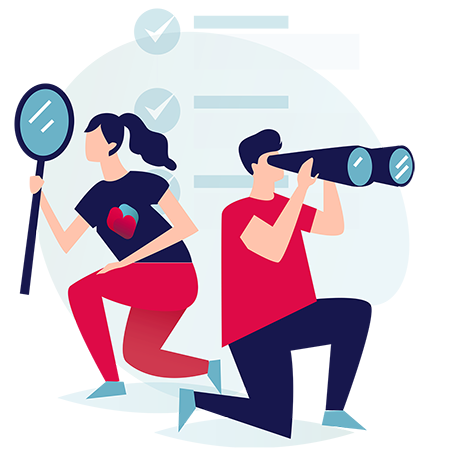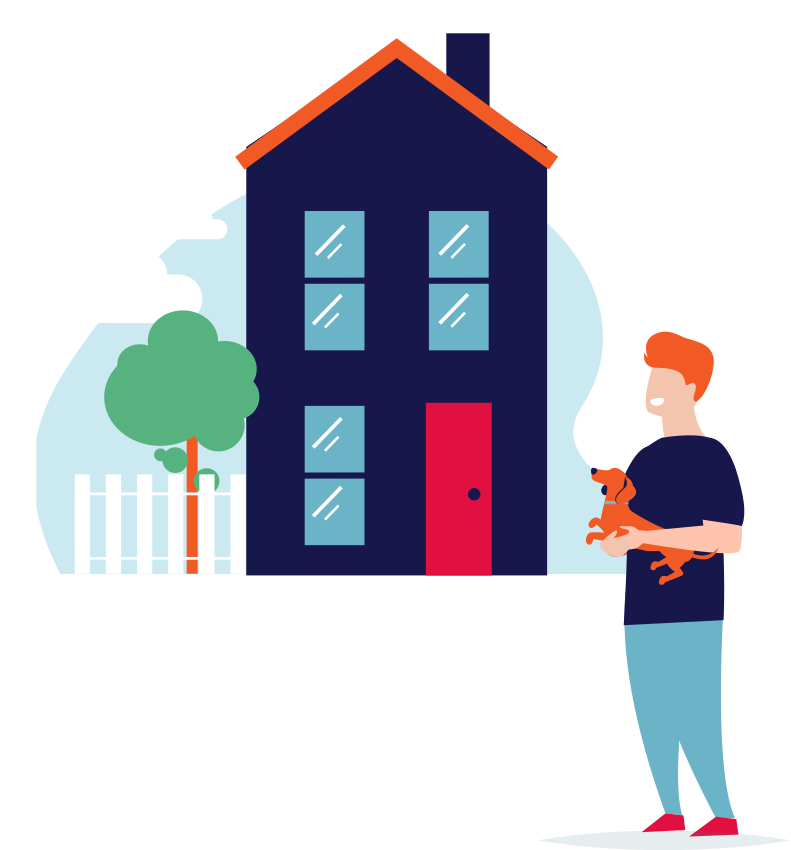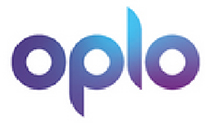So, you’re taking the plunge and applying for a loan. Borrowing money can be a great way to raise funds for a major purchase, debt consolidation, or buying a new home, and many give you the flexibility to pay the money off in instalments.
While plenty of loans are available, they typically fall into one of two categories; secured and unsecured.
Both have advantages and disadvantages, but choosing one isn’t as easy as it might seem. This guide will reveal the primary differences between secured and unsecured loans so that you can make the best decision for your financial needs.
Let’s dive in.
Are you a homeowner or a tenant?


What is a secured loan?
Secured loans are popular borrowing arrangements that allow you to secure a larger amount of money by offering assets as security. While some lenders will accept cars or other assets, the most popular is property equity.
Lenders tend to offer higher borrowing limits and lower interest rates with secured loans because they have security if you default on the repayments.
However, it’s important to remember that failing to repay your secured loan could put your home at risk, which also impacts your credit score and further borrowing options in the future.
The types of secured loans include:
-
Mortgages: Mortgages are secured loans because you pay off the money and gradually build up equity in the property. However, all mortgages (including second-charge ones) are long-term and typically have the best interest rates.
-
Homeowner Loans: These loans allow homeowners to borrow against the equity they have built in their property for home improvements, debt consolidation, or other significant expenses.
-
Bridging Loans: Bridging loans are short-term secured borrowing solutions that bridge a financial gap. They’re most common for people purchasing a new property and selling an existing one.
-
Secured Business Loans: These loans are specifically designed for businesses and require assets to secure the loan. They can help finance business expansion, equipment purchases, or working capital needs.
What is an unsecured loan?
Unsecured loans are more accessible than secured loans because they don’t require any assets.
Also known as personal loans, they’re often thought of as easier to get – but that isn’t always the case. These loans depend on your credit score and financial circumstances because lenders have more risks associated with lending you money.
However, personal loans are also highly flexible, and you can use them for numerous purposes, including paying for weddings, debt consolidation, and other purchases.
While unsecured loans provide the advantage of not putting assets at risk, borrowers must be aware of the potential consequences of defaulting on these loans.
Although lenders cannot seize the assets, they can still take legal action, send the debt to collections, or negatively impact the borrower’s credit score, making it harder to secure future credit.
The types of personal loans
Personal loans are any loan that doesn’t use your property or other high-value assets as security. The most common types of unsecured loans include:
-
Car Finance
-
Home improvements
-
Holidays
-
School Fees

Secured and unsecured loans: Which is better?
Now you know more about each type of loan, it’s time to look at the differences between both. It’s important to note there’s no correct answer when choosing between a secured or unsecured loan, but understanding the following differences can help.
Interest Rates
Secured loans generally have lower interest rates, as there are fewer risks for lenders, and these rates usually come in at around 2% to 10%, depending on the equity you have to offer and how much you borrow.
Unsecured loan interest rates are much higher because you’ll borrow money without offering the lender security. Loan providers will examine your credit score, financial history, and employment circumstances.
With a personal loan, there are no set interest rates, and they usually range between 6% to 36%, depending on what the lender is willing to offer you.
Loan Amounts
An unsecured personal loan can be beneficial if you want to consolidate some debts or make a small purchase, as they usually range from £1000 to £25,000.
The amount you can borrow with secured loans can exceed £100,000, making them the better option for large purchases.
Both loans depend on your personal circumstances because unsecured lenders go on your credit rating, while secured loan providers use the equity in your property to make a decision.
Remember, just because you’re eligible to borrow more money doesn’t mean you should. The monthly payments could get out of control.
Approval Process
Nobody wants to wait ages for a loan, and each lender might have different waiting times. There’s no way to tell how long you’ll wait as it depends on credit checks, signing documents, etc.
Secured loans are generally quicker because lenders look at your available equity and then offer you an amount. Unsecured loans require a more thorough assessment of the borrower’s creditworthiness, income stability, and debt obligations.
Repayment Terms
You’ll also need to factor in the repayment periods before deciding. Secured loans tend to have longer repayment terms because of higher borrowing limits. You usually pay the loan back over years instead of months.
With unsecured loans, you’ll usually pay them back over five years, but there are options to make higher monthly contributions and repay the total amount over months.
Impact on Credit Score
Both secured and unsecured loans have the potential to impact a borrower’s credit score in the short and long term. All lenders will want to perform a hard credit check before letting you borrow money, so it’s common for the score to decrease temporarily.
Late payments or defaults on either type of loan can significantly harm the borrower’s creditworthiness, making it more challenging to obtain future credit.
Risk to the Borrower
Both secured and unsecured loans can have certain risks for each borrower, but there are also plenty of benefits to each. A secured loan can cause issues should you default on repayments because you could lose the property.
Unsecured personal loans don’t put your assets at risk, but lenders have the right to take you to court and send the bailiffs in if you fail to stay in line with your repayments.
Availability of Loans
Secured loans are generally more accessible to borrowers with less-than-perfect credit or those seeking larger loan amounts – but you have to be a property owner in most cases.
Unsecured loans may be more challenging for borrowers with lower credit scores or limited income, and loan amounts may be smaller.
However, if you’re only eligible for a personal loan, you can still get some fantastic deals and repayment terms if you have a good credit score.

Choosing between secured and unsecured loans
If you’re lucky enough to choose both loans, you’ll have some things to consider. Both secured and unsecured agreements have advantages, and the right loan for you might not necessarily be a suitable solution for someone else.
To make the final decision easier, these are the questions you should ask yourself.
How much do I want to borrow?
If you’re borrowing money for a large purchase, you’ll be better off with secured loans. They offer more cash upfront and are easier to get. However, an unsecured loan might be best if you’re only paying for school fees or debt consolidation.
What’s my credit rating like?
If you have an excellent credit rating, you’ll get some great deals with an unsecured loan, but secured agreements are more suitable for individuals with poor credit scores. Lenders focus on the equity you hold in the property, giving you better rates.
Can you afford the repayments?
As a borrower, you’ll have to meet repayments set in place by the lender. Secured loans are easier to handle, but you often pay back the amount for years. Unsecured loans are quicker, but some might find them too intense.
It’s entirely up to you, but assessing your future financial stability is central to making the right decision.
Get the loan you deserve with a dedicated team of brokers
Secured and unsecured loans have numerous benefits. However, the loan you choose should suit your immediate and future financial needs. Take time to look at both, and you’ll make the right decision.
Would you like to discuss your eligibility for either type of loan? Believe Money has a specialist team of brokers who will find the right arrangement for you regardless of your financial circumstances.
Better still, our service has no upfront fees, and you can book a free consultation immediately. Contact us today, and we’ll find the best loan for your needs.
FAQs
Can I get a secured loan with bad credit?
Are unsecured loans always more expensive than secured loans?
Remember, if you’re borrowing a lot of money with a secured loan, it will work out more expensive further down the line, but unsecured loans have higher interest rates.
Why get a loan through brokers?
By choosing brokers, you can get better deals, regardless of your credit history.
How It works

Step 1.
Simple, easy application

Step 2.
We search our panel of lenders to find the deal that’s right for you

Step 3.
When you confirm your chosen deal, we get your application moving

Step 4.
The money lands in your bank
account – usually within two weeks
We compare loans from our panel of the UK’s top lenders to get you the best deal.
BELIEVE
Contact Us
Mon – Thursday 9am – 7:30pm
Friday 9am – 3pm
Call from a mobile or Landline:
01302 358 160








